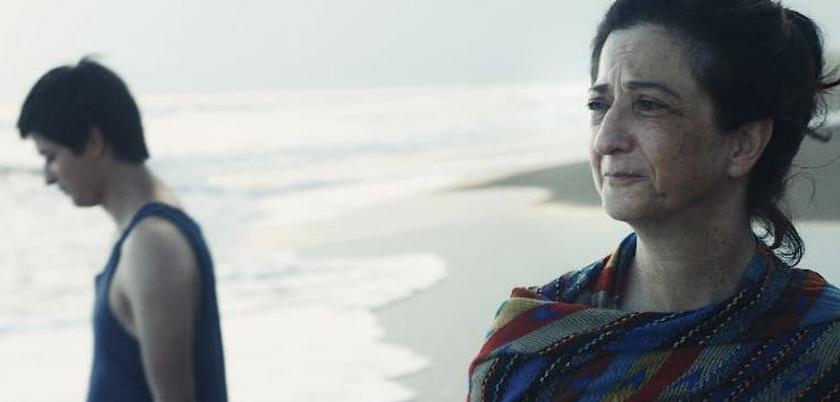Director Cesar Diaz’s debut feature film was made on a modest budget and confines its running time to a crisp 78 minutes, but its impact is like being hit over the head with a sandbag. We frequently hear the word “genocide” being bandied about, but Our Mothers revisits a monstrous specimen of it which most of the world has forgotten about.
It occurred during the 1980s, as the civil war in Guatemala ground remorselessly on and the indigenous Mayan people were subjected to systematic extermination. Their villages were destroyed, more than 200,000 people were “disappeared”, and 1.5 million displaced.
 Set in 2018, Diaz’s story centres around Ernesto Gonzalez (Armando Espitia, pictured left), a young anthropologist who is working for Guatemala’s Medico-Legal Institute, trying to identify the remains of missing victims. His work will be crucial to ongoing trials of those responsible for the hideous tally of dead – soldiers from the Guatemalan army seem to have done most of the killing and torturing, though the murky subtext of US involvement in Guatemala’s dirty war is evidently not within either the court’s or the film’s chosen remit.
Set in 2018, Diaz’s story centres around Ernesto Gonzalez (Armando Espitia, pictured left), a young anthropologist who is working for Guatemala’s Medico-Legal Institute, trying to identify the remains of missing victims. His work will be crucial to ongoing trials of those responsible for the hideous tally of dead – soldiers from the Guatemalan army seem to have done most of the killing and torturing, though the murky subtext of US involvement in Guatemala’s dirty war is evidently not within either the court’s or the film’s chosen remit.
After another gruelling day of piecing together fragments of human skeletons, Ernesto drowns his sorrows with his colleague Juan (Julio Serrano Echeverria). “To live in this country you have to be either mad or drunk,” he laments.
Ernesto’s researches take a sharp turn when he meets Nicolasa (Aurelia Cal, making her acting debut), a Mayan woman whose husband was one of the victims when an army unit turned up at her village, searching for anti-government guerrillas. As she stoically tells the story of how they flung the dead into a pit, raped the women and dragged other villagers away to some unknown purgatory, Ernesto’s expression of numbed horror is worth a dozen pages of dialogue.
But it’s when Nicolasa shows him a photograph of her husband and some guerrilla comrades that Ernesto’s antennae really start twitching. He digs a photograph out of the files which shows his own father, a guerrilla fighter whose disappearance continues to haunt Ernesto. Is he one of the men in Nicolasa’s picture?
 The agonising quest for closure is the theme which drives Diaz’s film, which the Guatemala-born director understands all too well since for many years he believed his own father had been “disappeared” by the regime. The film partially echoes his own experiences with his mother and their response to his father’s absence, and the scene where Ernesto’s mother Cristina (Emma Dib) is called to give her testimony before the judge is the film’s sucker punch, coming out of nowhere to throw a dramatically different light on the whole narrative. Both Dib and Aurelia Cal deliver powerful and painfully believable performances, their measured understatement vastly more eloquent than any Hollywood-esque grandstanding.
The agonising quest for closure is the theme which drives Diaz’s film, which the Guatemala-born director understands all too well since for many years he believed his own father had been “disappeared” by the regime. The film partially echoes his own experiences with his mother and their response to his father’s absence, and the scene where Ernesto’s mother Cristina (Emma Dib) is called to give her testimony before the judge is the film’s sucker punch, coming out of nowhere to throw a dramatically different light on the whole narrative. Both Dib and Aurelia Cal deliver powerful and painfully believable performances, their measured understatement vastly more eloquent than any Hollywood-esque grandstanding.
Diaz assesses the role of Guatemala’s mothers this way: “They hold the country together. If they let go, it will collapse. They hold memory, everyday life, and education. They transmit knowledge, continuance and values.” His film does them proud.















Add comment